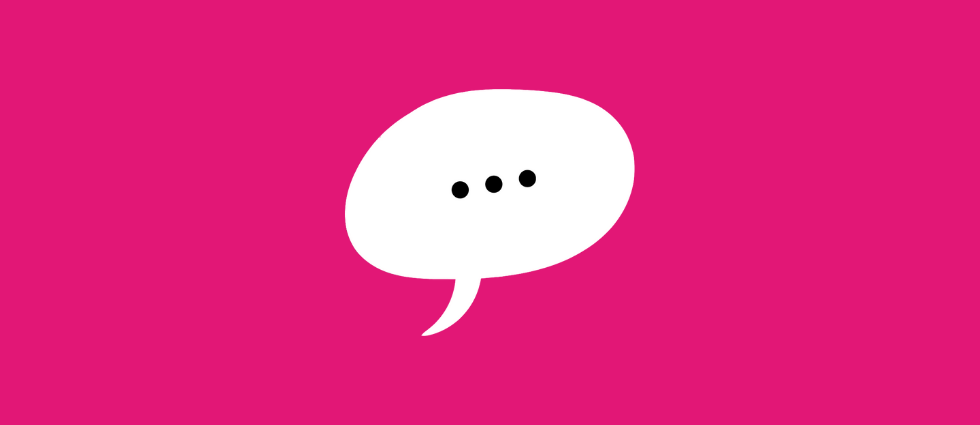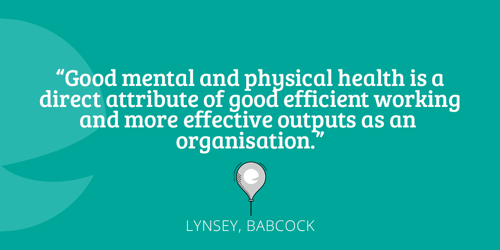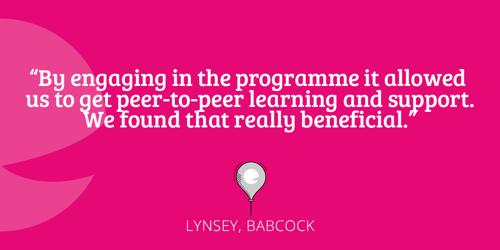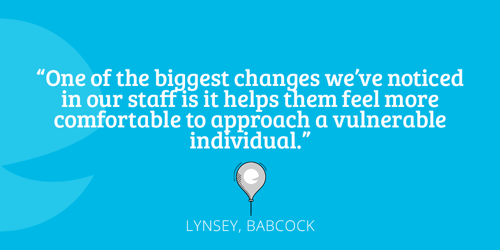
High Absence Rates
Lynsey from Babcock talks about their approach to tackling mental health stigma after noticing their high absence rates.
Organisation Profile:
- Number of employees: 1430
- Location: UK Wide
- Sector: Engineering
- Who are they: Babcock has provided engineering expertise in Marine, Land, Aviation, and Nuclear for over a century.
Lynsey Gilfillan, Head of Safety, Health, Environment and Quality at Babcock talks about why they got involved in WEF, the challenges they faced and how they are going to continue to move toward a workplace free from mental health stigma and discrimination.

The rail and the power based environments we work in are very inhospitable environments where we're working unsociable hours, we're working outdoors and we’re out in the middle of the night. That’s when we recognised that there was a potential risk for mental ill health out there. We didn't have a prescribed mental ill health problem within our absence statistics but we had a high volume of single day absences that indicated to us that something just wasn't quite right.
Suicide alertness and prevention is also pivotal to the organisations in which we work. We've got a very male dominated environment, but we looked at suicide prevention in two ways; for our own employees and staff but secondly to those members of the public that they engage with. It is highly likely if somebody is thinking about taking their own life they may go to areas we are working in. For our staff it was really important that we gave them the right tools and training and support to engage early with these vulnerable members of the public and help support them until proper help arrives, and that's something that we face on an almost weekly basis within the rail and power industries.
We already had an established relationship with See Me, so for us it was taking that next natural step to evolve and sustain our mental health message going out to our business.
We felt it was really, really important that not only did we get buy-in on the ground from our staff but we also got directorial leadership all the way through, to let our business understand that we recognise and take mental health seriously across our organisation, and understanding that a fit and healthy organisation is a profitable one.
Good mental and physical health is a direct attribute of good efficient working and more effective outputs as an organisation. So we will have less absenteeism and presenteeism and more effective delivery of our project co-works for our customer. People are much more settled in their work environment and much more comfortable to take on new challenges and become more productive if you create the right environment for them that recognises and supports mental health challenges.
I think this has been a really valuable pilot project that See Me is running. It's allowing companies to understand and introduce the subject of mental health and discrimination within the workplace in a soft framed environment that people can digest the message without being a frontal assault on the risks and the challenges that businesses face. This help and support that See Me have been giving in the employee surveys and evaluations, the action plans and programmes, and the additional training and support helps upskill all the managers and staff that are not only responsible for delivering the programme but also supporting those employees on the ground as well.

Engaging in this allowed us to get exposure to other organisations within Scotland and get peer-to-peer learning and support, and understand the challenges that we all face and how we can support one another as organisations to tackle that single problem of mental ill health and discrimination in the workplace. We found that really beneficial.
That peer-to-peer support in learning is a really useful tool because it allows each company to trial different activities, programmes, initiatives themselves, but it also allows you to share that experience, that learning, what worked well, what didn’t work well and also have a broader contextualisation of the risks and the problems that are out there that we all face as organisations and employees, and in fact as individuals ourselves. So that peer-to-peer learning we felt was really invaluable because we could provide support and initiatives that other colleagues could run with and they could give us something alternative in return.
The highlight for Babcock in being part of this pilot project is actually not only sustaining the existing journey we took ourselves but that there's still an appetite within our business to actually continue with our good work in this area. We also think it’s really beneficial continually bringing new messaging and new framing in from See Me to support our business in our operational delivery.
Sustaining it is going to be more challenging, keeping that message fresh without lecturing, without being laborious in the message that we're trying to convey, and being more innovative in the interactions that we can have with staff.

One of the big changes that we've noticed in our staff is that it helps them feel more comfortable to approach a vulnerable individual. It also gives them the skillset to identify mental health issues within themselves but also within their extended family. We've had several cases of staff coming to us to say and thanking us for the support because it's helped them deal with a troubled teenager, for example, or a family member that's going through a particularly challenging time. The training that we've given them has given almost life skills to support that going forward.
Our staff have actually recognised the leading direction that Babcock have actually taken, not only within our own organisation but within the rail industry in general, to actually identify and tackle mental ill health and discrimination within the workplace, and actually promote a more inclusive and open environment in which they can work. This is something that they've fed back to us on a regular basis on the positive measures that we've been taking.
We've found the work we’re doing with See Me is invaluable to establish a baseline understanding of what our mental health was as an organisation and help develop a framework of reactive and proactive delivery and programmes to raise awareness, to educate, to train, and further sustain that mental health message across our business.
Reasonable adjustments
Find out how reasonable adjustments can make a difference.
Spotlight on reasonable adjustments